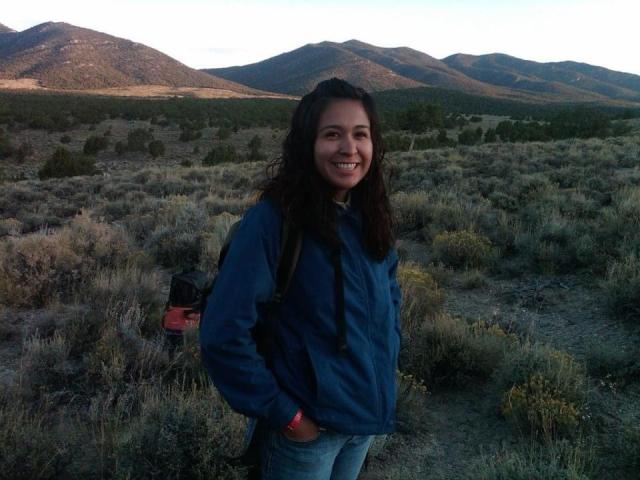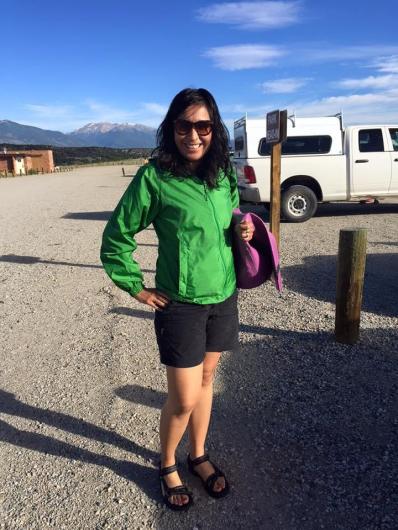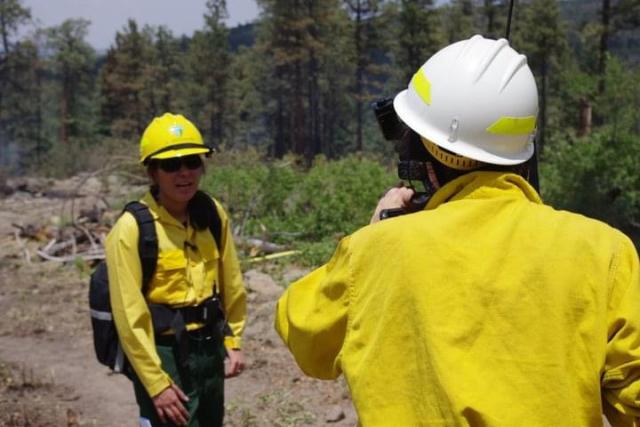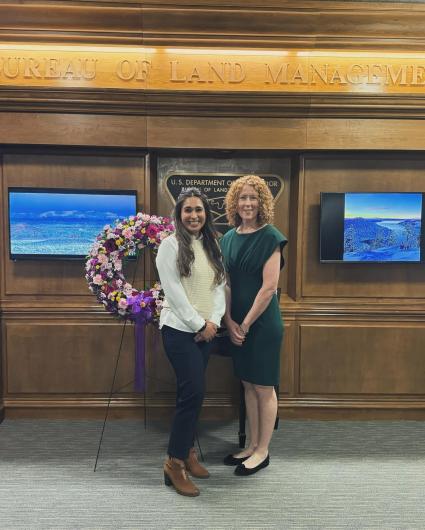You are viewing ARCHIVED content published online before January 20, 2025. Please note that this content is NOT UPDATED, and links may not work. Additionally, any previously issued diversity, equity, inclusion or gender-related guidance on this webpage should be considered rescinded. For current information, visit https://www.blm.gov/blog.
Meeting people where they are: Vanessa Lacayo
BLM Awards Coordinator Vanessa Lacayo grew up with a strong sense of her Chicana identity, thanks in large part to her maternal grandfather’s groundbreaking work in the field of Chicano Studies and his activism on behalf of the larger community.

He emigrated from Mexico to El Paso, Texas, at the age of 12. Although he spoke little English when he arrived, he went on to become a university professor and write 14 books on Chicano/a literature. For Vanessa, he exemplified both the importance of learning how to tell your own story and the significance of contributing to something larger than yourself—values that continue to shape her commitment to community empowerment, diversity and inclusion, and public service.
Vanessa chose to attend college at Metropolitan State University in Denver, where her grandfather taught at the time. There she experienced the power of storytelling, as she engaged with the many Latino/a and Chicano/a writers who traveled to the city to participate in colloquia, readings, and other events. Inspired by these artists, Vanessa helped establish a nonprofit that sponsored spoken-word and poetry workshops and to take part in the Colorado Latino Forum. Through these initiatives, she worked to cultivate the next generation of storytellers and community leaders, acquiring in the process her long-standing passion for mentorship.

Community building through engagement, mentorship, and storytelling—this is one thread running through the roles Vanessa has held as a journalist, deputy press secretary for the Colorado state legislature, public affairs specialist for both the Bureau and the National Park Service, spokesperson for the city of Denver, and now program analyst charged with overseeing the Bureau’s awards program. Another thread is increasing access to public spaces, services, and resources.
“From the very start I was impressed by the importance of the BLM’s mission and how it connected with my own desire to contribute to something greater than myself. I wanted to help the agency protect and preserve landscapes that will allow future generations to learn about and enjoy them, while also linking those sites to the stories of the different communities that visit our public lands,” Vanessa said. “All this is about increasing access to the land by meeting people where they are—understanding how we can best serve them. It’s about creating a place at the table for everyone, by inviting them to that table on their terms, not ours.”
While working at the BLM’s Colorado State Office, Vanessa wanted young people with a background like hers to be aware of the exciting possibilities of government service in support of the Bureau’s mission of multiple use and sustained yield. Working with local non-profit organizations she invited mentees to accompany her to the office. At the National Park Service, she connected with college students through the Latino Heritage Internship Program, bringing them to the office to meet her colleagues and get a sense of the important work they were doing.

On another occasion, she was with a student intern in a hallway at the office and noticed how nervous they were.
“I told them, ‘Hold your head high, and keep your chin up,” Vanessa said. “’If you’re the only person in this hallway that looks like you, then the others here need to see you!’”
Vanessa connected this incident to broader issues of recruitment and retention. She herself grew up without much access or exposure to public lands, and government service for a natural-resource agency was not a career path she’d envisioned. It was only when a friend mentioned a BLM internship opportunity that she considered the possibility. Later, when she started working for the agency and did not encounter many other employees who looked like her, a colleague with a similar background served as an informal mentor.
As Vanessa put it, “when it comes to recruiting and retaining the next generation of BLM employees and leaders, it’s a matter not just of reaching people where they are, but of then finding ways to make them feel comfortable and welcome in the workplace.”
Mentorship is one way to foster welcoming work environments. Another way is to highlight a variety of perspectives, experiences, and voices to reveal commonalities among BLM employees from different communities. For Vanessa, features written for the Special Emphasis observance months serve this purpose. They suggest how the Bureau’s employees can connect through shared stories, with a view to enhancing teamwork and collaboration, as well as retention.

She also pointed to the role models who have reinforced her desire to remain with the BLM and help advance its mission. As the Bureau’s awards coordinator she has had a front-row seat for the inspiring work being done by agency staff in so many different areas.
“Sharing stories of this work, lifting people up—my job is so fulfilling!” she said. “And it reminds me every day of how much of a difference we can make—for our families, in our communities, on our nation’s lands—through public service.”

Interested in learning more about Special Emphasis Programs? Contact your State/Center EEO Office for more information on local teams and the Headquarters Office of Civil Rights for more information on national programs and initiatives.
David Herman, Writer/Editor, BLM Experienced Services Program
Related Stories
- Overcoming challenges to move the BLM forward: Nikki Haskett
- BLM recreation sites available to all: Exploring accessibility on Arizona’s public lands
- Connecting Utah students to public lands careers
- A day in the life of a BLM Hobbs Petroleum Engineering Technician
- BLM Recreation Sites Available to All: Exploring Accessibility on Alaska’s Public Lands
